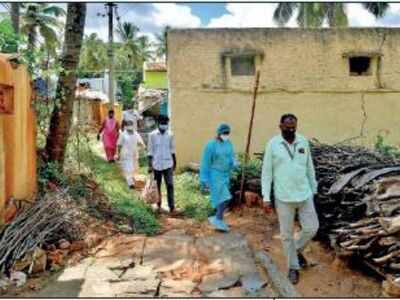Top Searches
- News
- City News
- bengaluru News
- Karnataka: Panchayats use different models to halt rural spread
Karnataka: Panchayats use different models to halt rural spread

A health team in a village near Bengaluru on May 31
BENGALURU: District administrations and zilla panchayats have been trying to tackle the Covid case spike in villages while grappling with a severe shortage of resources. Sandeep Moudgal looks at the different strategies adopted by local officials.
Ballari
Officials have formed ‘family task forces’ that cover 50 houses each in rural pockets. “The task forces comprise gram panchayat staffers, local youths and gram sabha members. Their job is to distribute medical kits among symptomatic patients even before the test results arrive, provide other support and conduct door-to-door surveys,” said KR Nandhini, the Ballari ZP CEO. The zilla panchayat has also deployed a post-graduate medical student or a nurse as a middle-level health provider for three to five gram panchayats. “The health provider’s job is to visit homes and conduct rapid antigen tests and monitor patients oxygen levels,” Nandhini said.
Dakshina Kannada
It has been one of the worst-affected districts in Karnataka. About 98 per cent of its villages have seen Covid-19 cases.
Kumara, CEO of Dakshina Kannada zilla panchayat (ZP), told TOI that the administration was following strategies like shifting patients from their homes to the nearest Covid care centre (CCC). “Many gram panchayat presidents arranged buses to move patients in home isolation to CCCs,” he said. Food kits are supplied to families with more than one Covid-19 case. Forming ward committees for every 100 houses in a GP has proved to be very effective in tracking infections. “Each committee monitors people visiting the houses and their health status and provides assistance whenever required,” the IAS officer said.
Bagalkot
Teams of ASHA and anganwadi workers conduct door-to-door health surveys across the district every week. “We focus on early detection, and provide medical kits without waiting for test results,” said Bagalkot ZP CEO T Bhoobalan.
Uttara Kannada
The district is using call centres and technology to stay on top of things. There is also a greater focus on triaging, an approach that has helped six gram panchayats become Covid-free. “In May, our medical team made 22,000 calls to all the patients in home isolation to assess their condition,” said Uttara Kannada ZP CEO Priyanga M.
Udupi
All 158 gram panchayats and 99 per cent of villages in the district have reported Covid-19 cases. “However, 70 per cent of the cases are in home isolation and unlike in some other parts of the state, the houses here are bigger,” said Udupi ZP CEO Naveen Bhat. Udupi is making greater use of telemedicine with the help of 50 volunteer doctors. It has distributed 4,000 pulse oximeters, bought using the MLA local area development fund, among self-isolating patients. There has been a complete lockdown in 35 GPs, with only milk, meat and medical stores allowed to operate. “Five more GPs have voluntarily announced a shutdown,” the IAS officer said.
Ballari
Officials have formed ‘family task forces’ that cover 50 houses each in rural pockets. “The task forces comprise gram panchayat staffers, local youths and gram sabha members. Their job is to distribute medical kits among symptomatic patients even before the test results arrive, provide other support and conduct door-to-door surveys,” said KR Nandhini, the Ballari ZP CEO. The zilla panchayat has also deployed a post-graduate medical student or a nurse as a middle-level health provider for three to five gram panchayats. “The health provider’s job is to visit homes and conduct rapid antigen tests and monitor patients oxygen levels,” Nandhini said.
Dakshina Kannada
It has been one of the worst-affected districts in Karnataka. About 98 per cent of its villages have seen Covid-19 cases.
Kumara, CEO of Dakshina Kannada zilla panchayat (ZP), told TOI that the administration was following strategies like shifting patients from their homes to the nearest Covid care centre (CCC). “Many gram panchayat presidents arranged buses to move patients in home isolation to CCCs,” he said. Food kits are supplied to families with more than one Covid-19 case. Forming ward committees for every 100 houses in a GP has proved to be very effective in tracking infections. “Each committee monitors people visiting the houses and their health status and provides assistance whenever required,” the IAS officer said.
Bagalkot
Teams of ASHA and anganwadi workers conduct door-to-door health surveys across the district every week. “We focus on early detection, and provide medical kits without waiting for test results,” said Bagalkot ZP CEO T Bhoobalan.
Uttara Kannada
The district is using call centres and technology to stay on top of things. There is also a greater focus on triaging, an approach that has helped six gram panchayats become Covid-free. “In May, our medical team made 22,000 calls to all the patients in home isolation to assess their condition,” said Uttara Kannada ZP CEO Priyanga M.
Udupi
All 158 gram panchayats and 99 per cent of villages in the district have reported Covid-19 cases. “However, 70 per cent of the cases are in home isolation and unlike in some other parts of the state, the houses here are bigger,” said Udupi ZP CEO Naveen Bhat. Udupi is making greater use of telemedicine with the help of 50 volunteer doctors. It has distributed 4,000 pulse oximeters, bought using the MLA local area development fund, among self-isolating patients. There has been a complete lockdown in 35 GPs, with only milk, meat and medical stores allowed to operate. “Five more GPs have voluntarily announced a shutdown,” the IAS officer said.
FacebookTwitterLinkedinEMail
Start a Conversation
end of article
